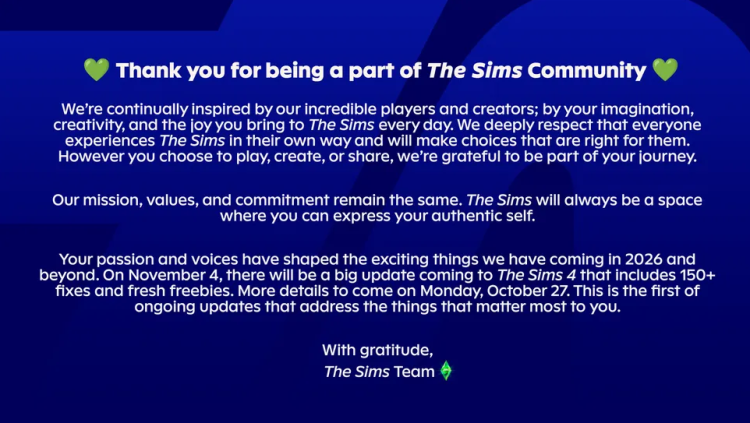The Sims Team Vows to Uphold Inclusivity After Saudi-Backed EA Buyout Sparks Creator Departures
Electronic Arts’ $55 billion acquisition by Saudi Arabia’s Public Investment Fund has prompted an exodus of major The Sims 4 creators and a rare public statement from the game’s development team. In a message posted to X, the team sought to calm the community’s growing unease by reaffirming its commitment to player expression and inclusion — a foundation that has defined the franchise for over two decades.
“We’re continually inspired by our incredible players and creators; by your imagination, creativity, and the joy you bring to The Sims every day,” the message read. “We deeply respect that everyone experiences The Sims in their own way and will make choices that are right for them. However you choose to play, create, or share, we’re grateful to be part of your journey. Our mission, values, and commitment remain the same. The Sims will always be a space where you can express your authentic self.” — The Sims Team
The statement arrived one day after several of the franchise’s most visible content creators announced their withdrawal from EA’s official Creator Network. The first wave included three long-time figures within the community, followed swiftly by others such as Vixella and Syd Mac. Their departure was framed as a moral and ethical response to the Saudi-backed investment, which, they argued, stands in direct contradiction to the inclusive principles that The Sims has historically embraced.
Over its long history, The Sims has maintained a distinctive relationship with its audience — one built on openness, humor, and the promise of freedom within its simulated worlds. The franchise has also earned a reputation as one of the most progressive in mainstream gaming, frequently advancing representation ahead of its peers. Its recognition of queer relationships dates back to the original Sims in 2000, when same-sex couples could form without restriction. More recently, The Sims 4 introduced updates allowing customizable gender identities, pronouns, and trans-inclusive character creation options, as well as accessibility features like hearing aids and mobility devices.
The 2022 expansion of My Wedding Stories provided a sharper example of the studio’s stance. When faced with censorship laws in certain countries, EA chose not to alter or remove same-sex marriage options, opting instead to withhold the pack from markets with anti-LGBTQ+ regulations. It was a decision that drew admiration from much of the global community and strengthened the franchise’s image as a digital refuge for self-expression.
That reputation is now under pressure. Saudi Arabia’s Public Investment Fund — the buyer behind the EA deal — represents a government with severe restrictions on freedom of expression, gender equality, and LGBTQ+ rights. Homosexuality remains criminalized, with punishments ranging from imprisonment to execution. These realities have cast a shadow over EA’s promises that company values will remain unchanged under new ownership.
For many in the Sims community, the moral contradiction is difficult to overlook. Former BioWare lead writer Trick Weekes voiced his concern shortly after the deal was first announced, predicting that “guns and football are in, gay stuff is out.” His remarks reflected a broader skepticism about how the fund’s influence might shape EA’s creative direction, particularly at studios known for inclusive storytelling such as BioWare and Maxis.

The Sims team’s post, though carefully worded, read as both reassurance and preemptive damage control. Its emphasis on gratitude and creative autonomy echoed the company’s corporate messaging — one that promises continuity despite an unprecedented shift in ownership. But for many creators, the issue extends beyond policy. The symbolic alignment of EA with a regime that criminalizes the very communities The Sims has long celebrated is, for them, impossible to reconcile.
Some players argue that financial motives will keep the franchise’s inclusivity intact. The Sims 4 remains a major revenue driver, with a broad, loyal audience and steady microtransaction sales. That economic weight could insulate Maxis from top-down interference, at least in the short term. Yet even if creative freedom persists, the association itself has already left a mark. The developers’ insistence that their “mission and values remain the same” might hold true within the studio, but ownership defines the framework in which those values operate.
The timing of the statement also aligns with a planned update for The Sims 4 on November 4. The team confirmed that this patch will include more than 150 bug fixes and “fresh freebies,” described as the first of several updates addressing community concerns. They also teased “exciting things coming in 2026 and beyond,” hinting at the next chapter in The Sims series — potentially Project Rene, the long-rumored evolution of the franchise.
Still, no amount of content updates can easily offset the discomfort surrounding EA’s new investors. Even among players willing to separate art from ownership, the buyout underscores how intertwined creative industries have become with geopolitical capital. For a series built on diversity and choice, the paradox is especially stark.
At its heart, The Sims has endured because it invites players to imagine lives beyond limitation. That invitation now feels strained. The developers’ words — “The Sims will always be a space where you can express your authentic self” — capture a vision that millions have trusted for years. Whether that space remains untouched under new ownership will determine not just the next stage of the franchise, but its moral legacy.
Read also, The Sims 4 Adventure Awaits Expansion Review, which explores how the game’s 20th expansion takes players to Gibbi Point — a New Zealand–inspired world of fishing, geysers, kayaking, and discovery-driven quests.

Comments